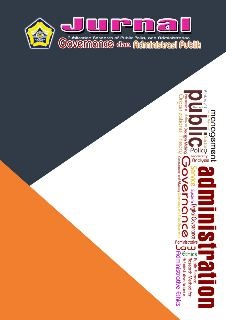Main Article Content
Abstract
Article Details
Copyright :
Authors who publish their manuscripts in this Journal agree to the following conditions:
Copyright in each article is the property of the author.
The author acknowledges that Journal of Governance and Public Administration has the right to publish for the first time with a Creative Commons Attribution 4.0 International License.
The author can enter the writing separately, regulate the non-exculsive distribution of manuscripts that have been published in this journal into other versions (for example: sent to the author's institution respository, publication into books, etc.), by acknowledging that the manuscript was first published in the Journal Governance and Public Administration;
Licence :
The Journal of Governance and Public Administration is published under the terms of the Creative Commons Attribution 4.0 International License. This license allows anyone to copy and redistribute this material in any form or format, compose, modify, and make derivatives of this material for any purpose, including commercial interests, as long as they attach credit to the Author for the original creation.
References
- Kemendikbud. 2012. Pengembangan Kurikulum 2013. Jakarta: Kementerian Pendidikan dan Kebudayaan
- Nazir, M. 2005. Metode Penelitian Survey, Rajawali Press, Jakarta. (hal.90)
- Moleong, J. Lexy. 2010. Metodologi Penelitian Kualitatif, Edisi Revisi. Bandung: PT. Remaja Rosdakarya
- Singarimbun, Masri danSofian Effendi. 1985. Metode Penelitian Survei. Jakarta : LP3ES
- Sugiyono. 2010. Metode Penelitian Pendidikan: Pendekatan Kuantitatif, Kualitatif, dan R&D . Bandung: Alfabeta.
References
Kemendikbud. 2012. Pengembangan Kurikulum 2013. Jakarta: Kementerian Pendidikan dan Kebudayaan
Nazir, M. 2005. Metode Penelitian Survey, Rajawali Press, Jakarta. (hal.90)
Moleong, J. Lexy. 2010. Metodologi Penelitian Kualitatif, Edisi Revisi. Bandung: PT. Remaja Rosdakarya
Singarimbun, Masri danSofian Effendi. 1985. Metode Penelitian Survei. Jakarta : LP3ES
Sugiyono. 2010. Metode Penelitian Pendidikan: Pendekatan Kuantitatif, Kualitatif, dan R&D . Bandung: Alfabeta.
